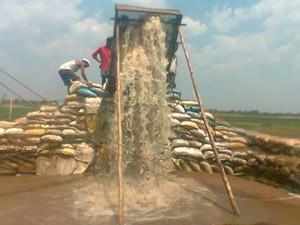 MADURAI: Environmentalists fighting against rampant illegal sand mining have hailed the gazette notification by the Union ministry of mines changing the rules that earlier allowed private companies to mine rare earth minerals found on beach sand.
MADURAI: Environmentalists fighting against rampant illegal sand mining have hailed the gazette notification by the Union ministry of mines changing the rules that earlier allowed private companies to mine rare earth minerals found on beach sand. They said the notification was much awaited and would help save the coastal treasures.
Activist Lal Mohan of Kanyakumari said rampant mining by private players had led to erosion of the shores and many sand dunes that acted as barriers during natural disasters such as tsunami had disappeared. He accused private players of influencing officials and exploiting coastal minerals and exporting monazite.
Stating that monazite on the coast had high concentration of thorium that was considered an atomic mineral, he said research was on to use it instead of uranium. “It is to eliminate the use of uranium and the large reserves of thorium in India. At many places, private companies have exploited thorium and exported it to Australia, China and Russia,” he said.
“Rampant mining on government poromboke land and private land close to the sea has resulted in coastal erosion and affected coastal villages and marine life. Since the government will now have the monopoly, it should check such violations,” he said.
Reserves of mineral-rich land should be acquired from private players and put to use so that the livelihood of those dependent on the industry will not be affected, he added.
However, the notification has disappointed private players in the industry. They said they were left with no option but to wait for a change of decision or formation of a new government.
The southern coast line of Tamil Nadu from Gulf of Mannar in Ramanathapuram district to Kanyakumari (including Tuticorin and Tirunelveli) is rich in many rare earth minerals like garnet, ilmenite, zircon and magnetite.
Managing director and CEO of V V Mineral, S Vaikundarajan, said there were eight major private players in India who had been trying to get an appointment with the Prime Minister for 18 months to explain the loss of revenue by the industry, of employment and revenue by the governments due to the ban on mining by private players.
The industry had exported titanium dioxide (TiO2) for 8,000 per annum and the government earned 20% value added tax on it. TiO2 is widely used in products on a day-to-day basis and the ban will lead to an escalation of the price of raw materials and related products in six months, he added